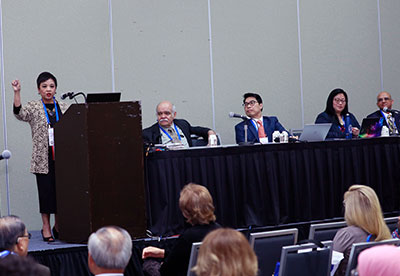History Track Session Focuses on Challenges Faced by IMGs

International medical graduates (IMGs) face multiple challenges as they simultaneously navigate roles as immigrants and as trainees in a new medical culture in which they must adapt to the expectations of patients, colleagues, and supervisors.
So said Antony Fernandez, M.D., a professor of psychiatry at the Virginia Commonwealth University School of Medicine and a panelist in a special 175th History Track session titled “The IMG in U.S. Psychiatry: Adversity, Advocacy, and Advancement.”
Fernandez presented comments he had collected from internationally trained residents who bore witness to the unique challenges they face. He quoted one graduate regarding the cultural “multitasking” required of IMGs: “I had to adapt to so many things: the new terminology, the language, … the technology. … The basic foundation of knowledge was there, but the remaining application of knowledge … was intimidating. … Catching up with all these things at once was overwhelming, but somehow I got through.”
Fernandez said that IMGs may face insensitivity and isolation in the workplace ranging from cultural misunderstandings to frank discrimination. Another trainee told him: “When we came … on board the first year, the second-years were all American, and [there was] some kind of cultural clash. … We were perceived to be different. … That created a lot of problems … and created conflict with the program director. … It was a very turbulent year.” While the American residents felt the first-year IMGs were incompetent and described them as antisocial, the IMG explained the differences between the two groups as cultural.
Trainees from other cultures coming to the United States may face subtle marginalization while also dealing with the issues related to their immigrant status. “My main fears were … always with the green card. … I wasn’t really at liberty to just go off and do a fellowship. … I very much wanted to get a job and make sure I was sponsored and could stay. To go off and do another fellowship, … I might have had to change my visa status and become a student. … I was just afraid. … You’ve got a lot of limitations.”
Trainees in the United States on J1 visas face multiple restrictions. (The J1 is a nonimmigrant visa issued by the United States to research scholars, professors, and exchange visitors participating in programs that promote cultural exchange, especially to obtain medical or business training.) Said one trainee: “You have to go to an … underserved area where an American has not been found to do the job. … You have to do at least three years. … You usually need that job to process your green card in the first place. … You cannot moonlight for three years. … You cannot travel. … If you travel, there’s always the risk of getting stuck.”
When Fernandez asked attendees how many were members of APA’s Caucus of IMGs, a fraction of the audience raised their hands, and he urged those who were not yet members to join. Members must be IMG members of APA and may also register in another minority or underrepresented caucus. The IMG caucus provides a venue to express concerns, share information, and seek solutions for issues that directly affect IMG psychiatrists, patients, and the community.
Joining Fernandez on the panel were Chair Norma Panahon, M.D., a past winner of the APA George Tarjan Award; Fructuoso Irigoyen-Rascón, M.D., of McAllen, Texas; Francis Sanchez, M.D., medical director of the Great River Medical Center and president-elect of the Iowa Psychiatric Society; and Elizabeth Santos, M.D., M.P.H., an associate professor of psychiatry and neurology and clinical chief of the Division of Geriatric Mental Health and Memory Care at the University of Rochester School of Medicine and Dentistry. Santos is also an Area 2 APA Assembly Representative.
(Image: David Hathcox)
|
|
|
|
|

